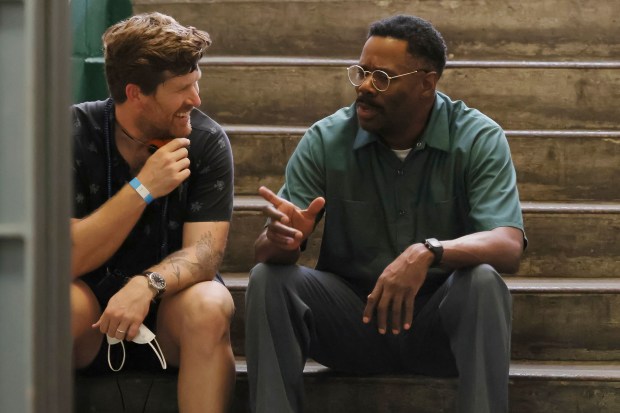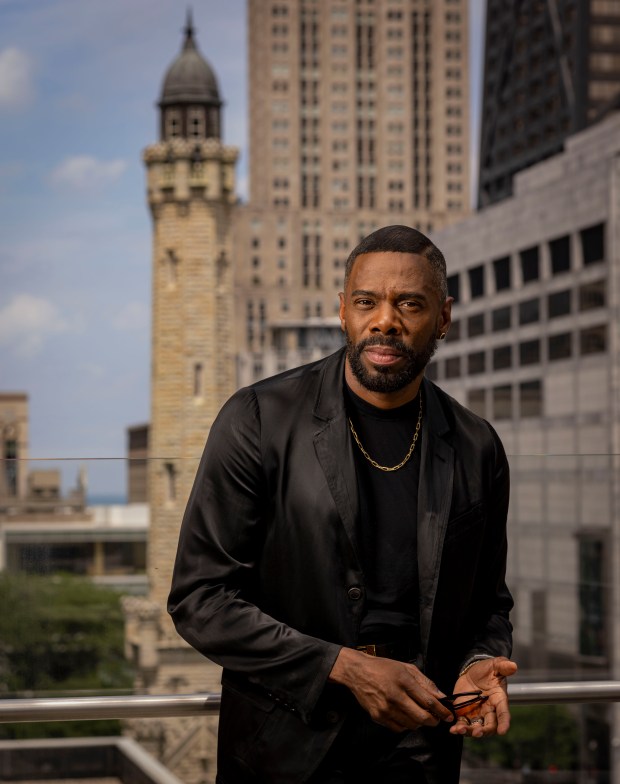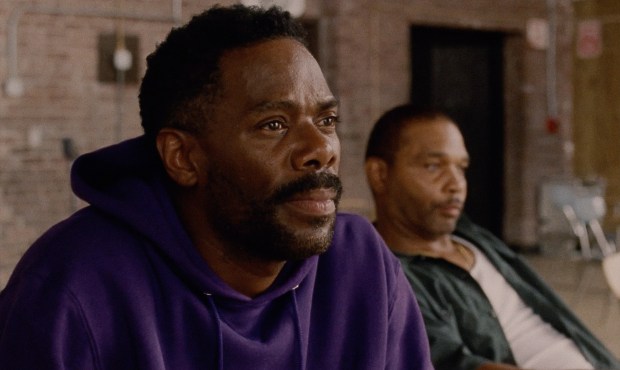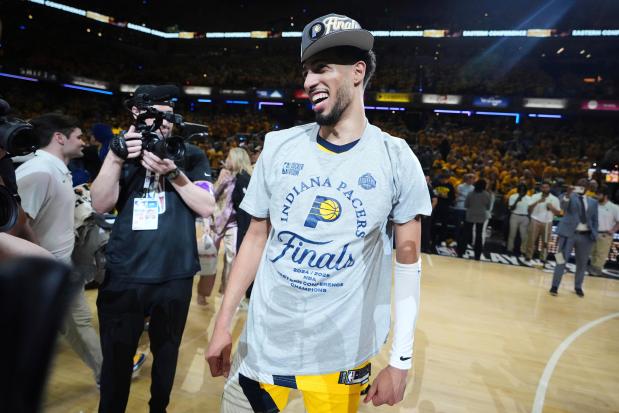Some actors are 90% voice and 6, maybe 7% something else. And that’s why they don’t add up.
Colman Domingo? Not one of those actors. An Oscar nominee last year for his full-bodied turn as civil rights leader Bayard Rustin in “Rustin,” and star of the very fine new film “Sing Sing,” Domingo could get by, probably, on his basso profondo speaking voice alone. But he doesn’t. He’s doing too much beyond it to make you believe who he’s playing, in moments of anguish, joy, volatility or stillness.
Take 2020, that lousy first COVID year. After many years of doing August Wilson’s plays all over the country, Domingo took on the role of Cutler, the easy-does-it session musician working alongside Chadwick Boseman and Viola Davis in the Netflix adaptation of “Ma Rainey’s Black Bottom.” That same year, in the jaw-dropper of a road trip odyssey “Zola,” Domingo anchored the craziness as the shape-shifting sex trafficker with more shades to his persona than most actors could manage convincingly in an entire career.
In “Sing Sing” the Philadelphia native plays John “Divine G” Whitfield, the real-life, self-described jailhouse lawyer who provided an early spark for New York State’s Rehabilitation Through the Arts prison program. While wrongly incarcerated, Whitfield performed Shakespeare and wrote his own plays in between advocating for other men up for parole and some — like himself — facing decades more of the life they’re living.
“Sing Sing” follows Whitfield and several other RTA drama participants, many of whom are played in director/co-writer Greg Kwedar’s film by their real-life equivalents. In a role nearly as large as Domingo’s, Clarence Maclin portrays a version of himself, and holds his own, affectingly. Much of the story concerns the rehearsal and performance of an original time-traveling fantasy featuring Hamlet, Freddy Krueger, cowboys and pirates. Meanwhile Whitfield mounts his case for his own exoneration, based on evidence that has come to light. But that light is dimming.
Among other skills, the actor playing Whitfield has mastered something elusive and genuinely rare: bringing an audience into the quiet whirrrrrrr of a character’s thought processes. If you trust the stillness, he told me, and you’re a little lucky, you can quit acting and simply be. And if everybody could do that, then the entire contemporary roster of screen actors would be up there with Colman Domingo.
Our conversation has been edited for clarity and length.
Q: First, before I forget: It was great to catch up with your one-man show “A Boy and His Soul” by way of Vimeo.
A: Oh, cool! Thanks! Wow, man. That was 2009. I was a bit more limber then. I was moving non-stop in that show.
Q: A kinetic experience, even when you’re not dancing, just to watch it. In “Sing Sing,” Divine G certainly has his explosive moments, but there’s a lot of the character doing very little, showing very little, hiding his cards more.
A: Right. Greg (director Greg Kwedar) talked about that. I brought to him this Japanese concept of ma, where everything and nothing is happening at the same time. In my work in cinema, I’m always trying to reach that place where the character work, the building of a character, leads to these moments of everything happening and nothing happening at the same time. In “Sing Sing” you need these moments of breath for the audience. But it’s also a moment of insight into what a character is thinking and feeling.
When I watched the finished film, I realized that at a couple of points I’d gotten on the inside of the character, into his interior life, when he’s trying to process what something means. One time (when Whitfield receives a massive mound of paperwork containing his ruling regarding clemency), when that brick of an envelope lands right in front of him, Greg told me he was going to have the camera up here (gestures to his face). Now, a life-changing moment like that can be played many different ways. Some actors might burst into tears. Some might go into a rage. This character is thinking about what the outcome will mean, for his coming years, for his self-worth. But as an actor I’m not thinking of any of that. I’m just playing the moment. And I needed the room and the time to do it.

Q: Somebody once said the greatest use of a camera is to show us the face of someone changing their mind or coming to a realization about something momentous.
A: Absolutely. It’s one of the most gorgeous things about the movies. This sounds like a name-drop, but I remember auditioning for Steven Spielberg for a film that eventually went away. In the audition he got behind the camera himself, and he told me he loved watching the shifts and transitions in my face. He told me that was a gift that I have. And he gave me a gift just by saying that.
For a long time, when I was primarily a stage actor, I was very performative. Now I’m a little more seasoned, and I feel that, I don’t know, falling back a little, sort of dropping into a role — that’s more like it.
Q: When actors are starting out, what’s behind the kind of performative impulse that might to, you know, too much? Is it the fear of being dull?
A: You just want to perform! You want to show, instead of be! This woman I met with last year, she told me: “For a long time you’re in your storytelling season. Then when you get to be about 60 or so, you move into your truth-telling season.” Maybe I moved into my truth-telling season a little early. I’m just trying to tell the truth, and instead of showing, just being. And trusting that an audience will go along with it, down a subtler, more nuanced road.
Q: Can you tell me about the pay equity and ownership stake idea behind the “Sing Sing” production?
A: It sounds so foreign to you, doesn’t it? (laughs)

Q: I mean, it’s un-American, obviously.
A: Right! “What is this thing?” Basically, they came to me with this project and asked to come on as a producer. And they asked for my opinion about how to get it financed. They said, “Well, one (budgetary) model is this: Now that you’re attached we can go out to find a studio to take on the film, in the studio system. Everyone’s paid a certain way, according to how they negotiate their contracts.”
Or, they said, there’s another way, more of a community-based model. We get independent financing, keep the overhead low, and make sure everyone participates. This means everyone above and below the line (production crew as well as major players and writers and such) gets paid the same rate, and you determine the pay on the number of days worked. But every single person participates in the financial outcome. That brings a different work ethic and everyone feels like it’s their film.
So that’s what we did. We kept our budget low, we sold it to A24 at a lovely price (during the 2013 Toronto International Film Festival). Everyone’s participating in the equity pool. And they feel good about it, especially because these men (who play themselves in “Sing Sing”) are giving over a lot of their life story.
Q: Let’s go back to Philadelphia, where you grew up. Can you recall the first film you saw as a kid that you just couldn’t shake?
A: “Carrie.” I was 8 or 9, maybe younger. Usually on Saturdays it was either my older brother or older sister’s turn to babysit me when my mom was working. The Locust movie theater (at 52nd Street and Locust, now closed) was right around the corner. My brother used to take me to every Bruce Lee movie possible, and I was a kid who didn’t like a lot of violence so I was always covering my eyes. My sister took me to horror movies, so she took me to “Carrie.” When that hand comes out of the grave? Please. I’d pass the theater walking to school, and I’d see that poster of Sissy Spacek looking beautiful at the prom in one picture and looking like the blood-covered daughter of Satan in the other. I’d walk by it doing this (hides his eyes). To this day I have never watched “Carrie” again.
Maybe I’m still unpacking some trauma from that one.
Q: With “Sing Sing” and “Ghostlight,” we have two movies this year celebrating the healing properties of art. That’s a tricky theme, I think. In the wrong hands the uplift can get a little …
A: I know what you mean. That fake-y inspirational stuff can feel manufactured. Wide-eyed, but not authentic. I haven’t seen “Ghostlight” but from the trailer it looks very grounded and honest about that idea. You just don’t want to feel like someone’s trying to get one over on you, or force you into a feeling.
Q: So what’s next?
A: I’ll tell you, at 54 years old, that question isn’t as pressing as it used to be (laughs). I’m trying to make space to live, to fill up my soul a little, especially when you give up so much in work like this. When you’re younger you’re always onto the next thing, because you want more and more. But I’ve built up a body of work now. I actually want some breaks. And I want to play in spaces I haven’t played in for a while. I’m doing a limited series for Netflix (“The Four Seasons”) with Tina Fey and Steve Carell. I have “Michael” (the Michael Jackson biopic) coming out next April. I’m playing Joe Jackson. That’s already done. And now I want a little time to catch my breath.
“Sing Sing” opens in Chicago-area theaters Aug. 1.
Michael Phillips is a Tribune critic.





